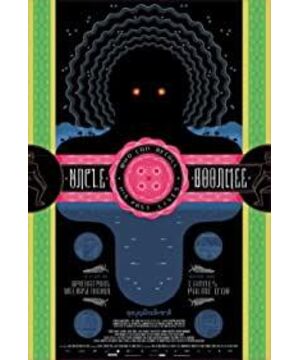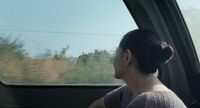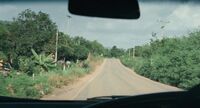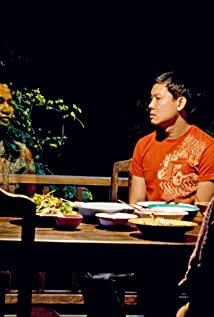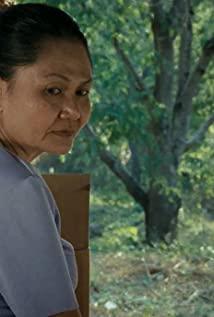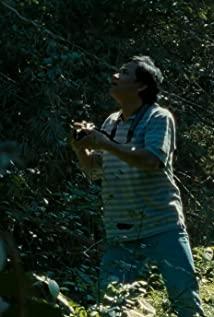The film opens with a cow breathing air in the twilight before breaking free and running freely in the fields. The buffalo traversed the field until a man re-bridled it. The ox was obediently tamed and followed its master away. A red-eyed ghost monkey witnessed it all. It would not be too wrong to read this opening in the most obvious way: the freedom that animals (including humans) once had, was tamed, and witnessed by a mysterious witness from the past into the future.
A small fragment, Apichatpong repeatedly presents in his films the disappearing traditional scenery of Thailand, and the current national history that he is trying to preserve. As a small country that cannot be completely separated from its traditional culture in the globalized world pattern dominated by big countries, Thailand passively accepts and obeys the new world order, while Buddhism and oriental mysticism in the traditional foundation are always the same. With, constantly questioning and resisting the invasion of a new civilization.
Pomi has kidney disease and will die soon. His sister-in-law, Azhen, and Xiao Dong (whose identity and interpersonal relationship cannot be determined, only know that he is a young man who calls Azhen Auntie, and becomes a monk at the end of the film), will take care of him together. At dinner, the ghost of Pomy's wife and his missing son, who has turned into a red ghost monkey, come to visit. Pomi's son warned his father that the breath of death he exuded attracted many ghost monkeys like him, and it was extremely unsafe outside. The family reunites at the dinner table, and the son recounts how he disappeared, and a few bland flashbacks restore a series of his past lives. It turned out that after the death of his mother, he took pictures with the camera left by his mother. On the negative, he found the ghost monkey that he accidentally photographed, so he began to look for the trace of the ghost monkey. Wife, he has also become a ghost monkey.
In this scene, the director did not want to create any sense of terror or spectacle to catch the audience. The ghost came to the dining table like a normal person. After the living person showed a brief moment of amazement and fear, they communicated with the ghost, as if they had not been for many years. See old friends meet again. The audience does not need to work hard to suppress their fear of ghosts, so they naturally accept the director's arrangement. With the directness and boldness of an experimental film, the director presents the supernatural in a completely anti-Hollywood tradition, and creates his own unique world of Apichatpong.
Bomi wants to entrust the farm to her sister-in-law after her death, but she doesn't want to take over this farm with ghosts and illegal workers. Pomy's wife, Ahui, guarded her sister Azhen for one night. It seems that part of Ahui's soul also entered Azhen's body (this may explain Azhen's avatar technique at the end of the film, and Ahui helped her obtain supernatural powers) .
The scene about the princess is head-scratching, and it is difficult to determine the connection between its function and narrative, and it is impossible to determine whether it is the fantasy of the sister-in-law or the spring dream of Xiao Dong or Pomy. It may also be something that happens at the same time in parallel time and space. It may also be an episode that has nothing to do with the previous narrative, but is inserted in and does not hesitate to interrupt the narrative. An ugly princess who sees a beautiful reflection in the water. Although being a princess gives her everything, she is a self-aware princess who knows her ugly truth. A catfish lured her into the water. The princess took off her robe and jewels as a gift to the water god for beauty in the water. The glory of the world is false and cannot make her happy. Only by abandoning the glory of the world can she obtain what she desires most. Once again, the director seems to affirm the exhortations and promises of Eastern Buddhism. Everything in the material world is a yoke, and it is best to give up.
Bomi worries that she will never see her ghostly wife again after she dies. So I decided to drop everything and go with my wife. He and his wife, Ah Zhen and Xiao Dong found a cave full of sparkling minerals. Bomi said the cave was like a womb. He remembered that he was born here. Bomi recalled his previous life. A ghost monkey who is non-human and non-animal just like his missing son. He rides a time machine to the future. The future world is ruled by power, and they can make anyone disappear. They shone to pieces from the past with intense light. Pomi was afraid of being caught and ran around, but he was always caught, and his captors kept snooping on his memories of the past, and then he disappeared. Bomi never woke up after recounting this past life memory. At dawn, Ah Zhen and Xiao Dong left the cave.
In this memory, Bomi recalled his past life, and his past life took a time machine to the future. Is that future Bomi's present life and this life? Or the future of Bomi's life? The time given by the director is ambiguous, especially about the future time node. The past, present, and future are told in an Eastern sense of time, and past lives are especially valued by Easterners. Because the past life determines the present life. The happiness and misfortune of this life are answered by constantly asking about the past life. The eastern concept of time is not as precise as the western one, but only summarizes the past and present life with the largest span. The eastern concept of the future can almost be regarded as non-existent, and the future is always being dissolved in the cycle of past and present life. Apichatpong can only explain his own concepts in terms of his own culture.
The theme of the film is about death and, inevitably, the issue of time. Apichatpong repeats his artistic concepts and thematic expressions: the boundaries between past and present, tradition and modernity, fantasy and reality, body and spirit are broken. It is Buddhist animism, the belief in supernatural power mysticism that unites two irreconcilable contradictions.
Illegal immigrants from Laos, whom Bomi once killed, uncovers the film's political dimension. As with the supernatural, Apichatpong does it in a very natural and prosaic way, with no intention of creating any noticeable effect. Bomi believed in karma, and he felt that he was seriously ill because he had killed too many people before. Jane dismissed his concerns, but she also took it to recall her own father, who chose to hunt in the forest rather than kill, a deliberate rebellion against authority and a deeper connection to the natural world is always another options exist. The film's subtle hauntings of its violent and military past are a must-have for an intellectual to be affirmed, and the director carefully conveys it.
Bomi recalled the past life when he came to the future, was captured, mocked, and humiliated and feared in an instant.
The use of still photos is a common practice in Apichatpong. He uses the techniques of contemporary art to throw out the doubts about contemporary art that have always puzzled the public. The simple juxtaposition and confrontation of objects or images seems to contain a fragmented interpretation of a certain postmodern concept, usually about the uncertainty of time, the absence and ambiguity of subjectivity.
Jane held a funeral for Bomi. Xiao Dong became a monk who recited sutras, and he did not make any explanation for the change of identity and occupation. Maybe he was a monk from the beginning, and he took leave to do hospice care for Bomi. Maybe he was a monk in the secular world. He put on a cassock when he needed it. When he is young, he can wear casual clothes and avoid meat and fishy, and he does not understand the religious situation in Thailand. The identity of Xiao Dong is always difficult to determine. In short, after finishing the ritual, the monk Xiao Dong couldn't sleep at night for some reason, so he got up and went to find Ah Zhen. The final scene of the movie is inexplicable, Ah Zhen and Xiao Dong obtained the avatar technique, one body stays in front of the TV, and the other body goes out to eat dinner. Xiao Dong, who had to penetrate the red dust in order to become a monk, was stunned by his avatar, while A Zhen, a city girl who had absolutely no wisdom roots and hated the countryside, was calm about her other body. Facing the modern TV sets, mobile phones, computers, and neon lights, the mystery of the East emerges once again inexplicably, confronting the audience with the modern daily life familiar to the audience.
Although there are many supernatural phenomena, the director's perspective is always realistic, and the director proposes an Eastern way of thinking about major philosophical propositions in the most intuitive, simple and direct way. But directors educated in the United States also occasionally show fashionable Western philosophical ideas in their films, such as the obsession with the body, especially the sick body. Jane, who is a little lame, and Pommy, who is wearing a urine bag, Western medicine treats these sick bodies in exaggerated and frightening ways. The director always uses the camera to show them in detail.
Only in Apichatpong's films can we reflect on the extent to which we are dominated by Western narratives, completely disregarding the rules, and the genre has nothing to do with him. Everything in Apichatpong's films makes us feel The uncomfortable time sequence, narrative angle, logical relationship, various symbols and metaphors seem to torture the audience endlessly. I was also very surprised at how sharp the judges at the Cannes Film Festival were (completely ignorant of Thailand's history, traditions and present, and Buddhism, but they could quickly sense what the director was about to say), or how profound (feelings). Less talented, but well-versed in Thailand, Buddhism, semiotics, experimental film, and contemporary art), was able to decide to award the Palme d'Or to Apichatpong during the short judging cycle of the festival. I don't want to question Cannes and the judges, they are not alone, the director has won a lot of solid fans after all. But I believe that there must be some beautiful misunderstandings between the director's expression and the judges' understanding. Because Apichatpong's narrative opens in all directions, each narrative can be interpreted accordingly. Every intentional or unintentional symbol can also have signifiers and signifieds that vary from person to person. Most audiences know very little about religion, about Thailand as a country, about the historical development of cinema. And the director doesn't have a solid foundation for all possible interpretations. Everything relies on and rationalizes the audience's own guesswork. Finding a convincing explanation among the fragments is the rights and freedoms of the audience. If you want to see it, then instead of complaining that you can't read Apichatpong, it's better to enjoy the freedom he offers.
View more about Uncle Boonmee Who Can Recall His Past Lives reviews


